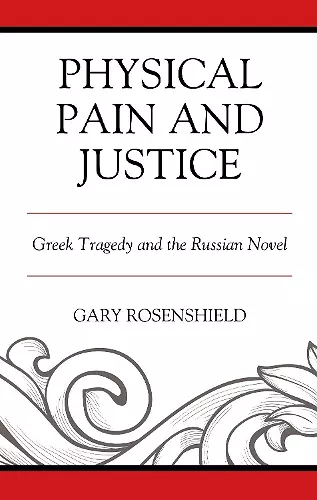Physical Pain and Justice
Greek Tragedy and the Russian Novel
Format:Hardback
Publisher:Bloomsbury Publishing PLC
Published:4th Oct '17
Currently unavailable, and unfortunately no date known when it will be back

It has been said that all great literature is about suffering. But before the twentieth century, physical pain, one of the most primal forms of human suffering, has rarely been represented on the stage and in fiction. But when it is foregrounded in works of literature, it is not only the most dramatic way of representing human suffering, it is also used to explore, in the most intense form, existential questions regarding the meaning of human existence and the justice of the universe. Perhaps it is not entirely coincidental, then, that imaginative works about physical pain, though few in number, figure prominently among the masterpieces of the western literary tradition. The best were written during two of the west's most astonishing periods of literary creativity, fifth-century-BC Athens and nineteenth-century Russia, and by the most prominent artists of their time: Prometheus Bound by Aeschylus, The Women of Trachis and Philoctetes by Sophocles; Notes from the House of the Dead by Dostoevsky; and The Death of Ivan Ilyich and War and Peace by Tolstoy. In all these works, physical pain is always portrayed as a dynamic process that includes the view point of the victim, the perpetrator (much of the physical pain is in the form of torture), and the onlooker or witness. In the Greek works, physical pain is the main vehicle for exposing the injustice of the gods and the world order, and in the Russian works for questioning the moral legitimacy of the state. In Prometheus Bound, Zeus delegitimizes his rule by torturing Prometheus for his service to mankind. In The Women of Trachis, the gods look indifferently upon the excruciating suffering of Hercules, the greatest Greek hero. In Philoctetes, the gods cruelly exploit the terrible pain of the hero as a means of winning victory at Troy for their Greek wards. In the Russian works, the mechanisms for inflicting the maximum amount of physical pain during corporal punishment undermine the moral foundations of the state and argue for its dissolution. Though the Greek and Russian works are separated by genre (plays vs novels) and by time (over two thousand years), they are united by the way they employ pain to investigate the justice—or rather injustice—of the world order.
Hurting broken bodies might be the global norm, but this fascinating book claims that pain—not routine moral or mental suffering, but the body in chronic excruciating physical pain—has been understudied for what it can tell us about just and unjust world orders. Three great brutal Greek tragedies are juxtaposed to three classic sites of pain in Dostoevsky and Tolstoy. The ancients in their theodicy are shown to be surprisingly open to the risk of sympathy, both by humans and immortals; the Russian novelists, in their sociopolitical musings, surprisingly cold-blooded about clemency. This is affect or emotion studies at its best. Rooted in real bodies kept alive in literary masterpieces, pain is linked with witnessing, compassion, outrage, and the survival of the state, all of which inevitably leads out of itself into cosmic questions of injustice and potentials for its transcendence. -- Caryl Emerson, Princeton University
Rosenshield’s analyses are painstaking and insightful. . . . As an introduction to a topic that has for millennia remained of central importance and bewilderment for the human consciousness it is a welcome addition to the study of world literature. * The Russian Review *
Gary Rosenshield’s scholarly masterpiece dives into uncharted territory to explore physical pain in classical Greek plays and nineteenth-century Russian novels. Enlightened readers will come to grasp the ligatures between ostensibly disparate worlds—that of Aeschylus, Sophocles, Dostoevsky, and Tolstoy—and emerge with an epiphany about justice and injustice. But those more courageous will venture forth to traverse that timeless Rosenshield path to broach the questions of today about the legitimacy and justice of any society that uses physical pain as a means of gaining political and moral authority. -- Amy D. Ronner, St. Thomas University
This study fiercely tackles big questions about pain and justice through the bifocal lens of the tragedies of Aescyhlus and Sophocles and the work of Dostoevsky and Tolstoy. By linking depictions of pain to indignation or horror at injustice, Gary Rosenshield discovers a previously unexplored supra-narrative where the multiplicity of possible relationships among victims, perpetrators, and witnesses occupies center stage and transcends differences of time, culture, and ideology. -- Robin Feuer Miller, Brandeis University
Gary Rosenshield has provided a significant new contribution to his already long record of outstanding scholarship. In Physical Pain and Justice: Greek Tragedy and the Russian Novel, he analyzes six foundational works by four different writers as representations of physical pain and suffering and finds unexpected thematic correlations among them. In particular, his conclusions provide innovative and stimulating insights into the political, historical, and social concerns of the writers and the times in which they lived. This important book will, of course, be of great interest to scholars concerned with the writers and works discussed. At the same time, the author’s direct and accessible style and his concern with the universal experience of physical pain and its implications will attract a more general audience as well. -- Gary R. Jahn, University of Minnesota
ISBN: 9781498568456
Dimensions: 239mm x 157mm x 20mm
Weight: 454g
216 pages